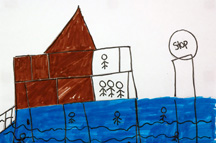| November 1, 2007 from Morning
Edition
STEVE INSKEEP, host: A new report on the mental health of Hurricane
Katrina survivors contains some surprising information. The study's
author says what's going on in the Gulf Coast is contrary to
the patterns usually seen after major disasters. And we have
more this morning from NPR's Alix Spiegel.
ALIX SPIEGEL: Ron Kessler of Harvard Medical School started collecting
data about the mental health of Katrina victims about five months
after the storm hit the Gulf, and the first batch of information
he collected and published was pretty much what he expected.
The research showed PTSD and other mental disorders were roughly
double what they were in the general population, which was high
but not totally out of the ordinary. What's striking, he says,
about this new batch of data is that it doesn't conform to the
usual pattern. For example, Kessler says, rates of PTSD almost
always decline in the two years after a major traumatic event.
Dr. RON KESSLER (Harvard Medical School): The majority of people
in that one year and certainly the two year windows time recover,
and in very bad situations you fail to find that, that there
is not as much recovery or in some extreme cases no evidence
of recovery. But we virtually never find an increase, and were
are finding a doubling in the prevalence of PTSD in most of the
area affected by Hurricane Katrina. That's really quite striking.
SPIEGEL: And it's not just PTSD that's on the rise in many of
the areas affected by Katrina. Kessler says the research shows
there's been a huge increase in the prevalence of other mental
health issues, including what's called suicidal ideation.
Dr.
KESSLER: It's now up to eight percent. So that's a pretty substantial
number of people; eight percent of the population is thinking
about killing themselves.
SPIEGEL: And, Kessler says, there's
another way that the research they've collected points to something
unusual.
Dr. KESSLER: In typical disaster situations, you find
that disadvantaged people, people who are disadvantaged to begin
with, are affected most - poor people, the elderly. That wasn't
the case here. It seemed to be a kind of an equal opportunity
disaster: rich and poor, young and old, male and female, black
and white.
SPIEGEL: Mental health professionals on the ground
in New Orleans seem to agree with Kessler on this point.
Ms.
CECIL TEBO (Social Worker): Every end of the spectrum.
SPIEGEL:
That's Cecile Tebo, a licensed clinical social worker who worked
for the New Orleans Police Department. Two days ago, Tebo says,
she got a suicide call from a posh neighborhood in New Orleans.
She says she walked into the house carrying a pair of restraints
but was immediately told by the man who had called that she didn't
need them.
Ms. TEBO: He goes, oh, I'm not going to need those.
I don't need those. I'm a mental health professional. I work
in the field. I understand this stuff. And he said he had been
having thoughts of killing himself; but worse, he was having
serious thoughts of killing the air conditioner man. So I'm like,
oh yeah, like everybody else. And he said, no, I'm very serious.
He really - he was planning on the next time the air-conditioning
man came to his house, he was going to kill him.
SPIEGEL: Kessler
theorizes that part of the reason people in New Orleans and other
areas of the Gulf Coast are struggling like this is because of
the slow pace of recovery. And he points out a disturbing reality
about the long term effects of persistent PTSD.
Dr. KESSLER:
People who persist in having PTSD for two years or longer very
often become chronic cases.
SPIEGEL: Which means that mental
health problems might linger in the Gulf region for years to
come.
Alix Spiegel, NPR News, Washington.
Copyright ©1990-2005 National Public Radio®. All rights
reserved. No quotes from the materials
contained herein may be used in any media without attribution
to National Public Radio. This
transcript may not be reproduced in whole or in part without
prior written permission. For further
information, please contact NPR's Rights and Reuse Associate
at (202) 513-2030.
|



